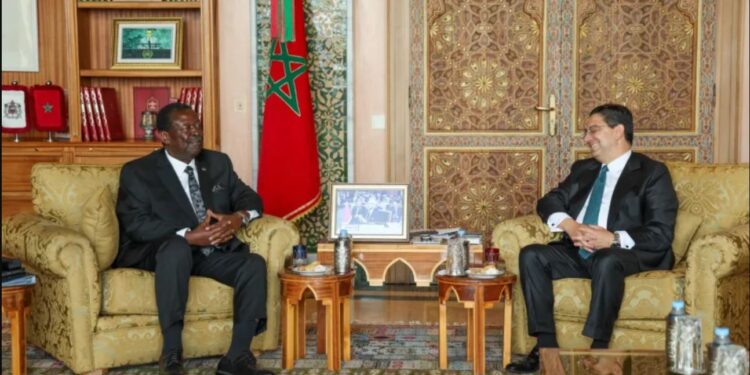Kenya and Morocco have signed five new Memoranda of Understanding during a high-level official visit to Rabat, deepening bilateral ties in a strategic move aimed at boosting cooperation in trade, education, diplomacy, and development. The agreements, announced during a joint press conference between Prime Cabinet Secretary and Foreign Affairs Minister Musalia Mudavadi and Morocco’s Foreign Minister Nasser Bourita, mark a milestone in a relationship that now spans sixty years.
The presence of Musalia Mudavadi in Rabat, both as Kenya’s Prime Cabinet Secretary and Foreign and Diaspora Affairs Minister, symbolized the high-level importance Nairobi attaches to this relationship. In his remarks, Mudavadi reaffirmed Kenya’s resolve to pursue active implementation of the newly signed agreements. He emphasized that these MOUs were not symbolic gestures but practical frameworks that will translate into tangible development outcomes for both nations.
A key highlight of the visit was Kenya’s strategic push to address the significant trade imbalance between the two countries. Morocco currently exports over 12 billion Kenyan shillings worth of goods annually to Kenya, mainly in the form of fertilizers and industrial commodities. In contrast, Kenya’s exports to Morocco stand at only 500 million shillings, a gap Nairobi is keen to narrow. Mudavadi called on Rabat to increase its imports of Kenyan tea, coffee, and fresh produce—sectors where Kenya holds comparative advantage and global reputation.
The economic engagement was not confined to trade statistics alone. Kenya requested concessional fertilizer pricing for its farmers from Morocco, a global leader in phosphates. Such support could enhance agricultural productivity, bolster food security, and reduce the cost of inputs for Kenya’s agrarian economy. Furthermore, Kenya proposed direct air routes linking Nairobi with Rabat, Casablanca, and Marrakech. These flights would boost tourism and open fresh channels for business, cultural exchange, and logistical connectivity across North and East Africa.
Education and employment also formed a central part of the discussions. Currently, only twenty Kenyan students benefit from Moroccan government scholarships. Nairobi has formally requested an increase in these opportunities. Mudavadi also advocated for the recruitment of Kenyan English teachers by Morocco, citing the rising demand for English language instruction in the country. Such exchanges could create employment while deepening cultural diplomacy.
In a significant diplomatic gesture, Kenya officially opened its embassy in Rabat during the visit. This development is poised to accelerate the implementation of joint projects and enhance Kenya’s presence in North Africa. Morocco welcomed the move as a sign of seriousness and long-term commitment from Nairobi. In reciprocity, Kenya added Morocco to its e-Visa list, while Rabat pledged to facilitate similar ease of access for Kenyan nationals.
On the political front, the two countries reaffirmed their partnership in multilateral institutions including the African Union and the United Nations. They reiterated a shared commitment to regional peace and global stability. Kenya’s endorsement of Morocco’s autonomy plan for the Western Sahara, described as the only credible and realistic solution to the longstanding territorial dispute, was warmly received in Rabat. This gesture, which aligns Kenya with a growing number of African, Arab, and Western countries, has been interpreted as a strategic realignment that could yield long-term diplomatic dividends.
Morocco’s Foreign Minister Nasser Bourita described Kenya as a strategic anchor in East Africa and commended President William Ruto’s leadership on matters of regional peace and economic transformation. He praised the momentum generated by Mudavadi’s visit, noting that the next step will be the convening of a bilateral joint commission before the end of the year, and the organization of an economic forum and business delegation in Nairobi.
The private sector in both countries has been encouraged to take advantage of the favorable political climate and the expanding legal framework now governing bilateral cooperation. Agreements on double taxation avoidance and investment protection are in the pipeline, designed to stimulate cross-border investment and reduce commercial risk.
As Kenya and Morocco step into a new chapter, their partnership reflects the principles of South-South cooperation grounded in mutual benefit. Both countries now stand as complementary gateways to East and North Africa, poised to influence continental development and integration. The new agreements underscore that for Kenya, diplomacy is not only about international positioning but also about delivering results for its citizens.
Kenya’s foreign exchange reserves have climbed to a historic high of nearly $10.59 billion, according to the latest financial markets bulletin released by the Central Bank of Kenya...
Read moreDetails









